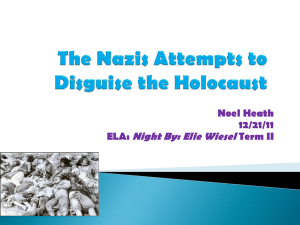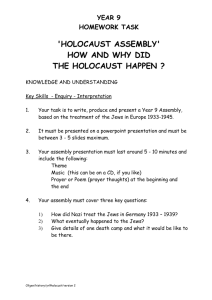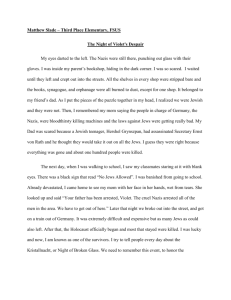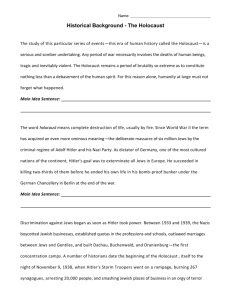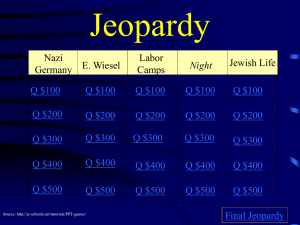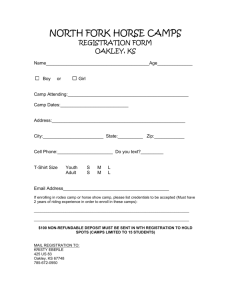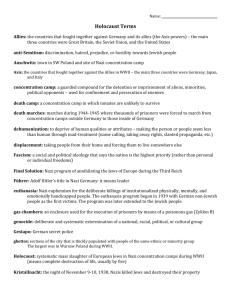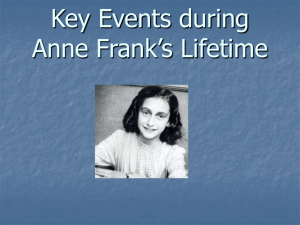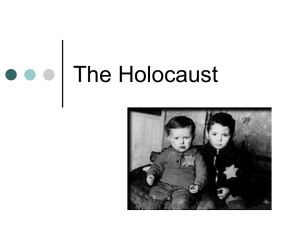Holocaust Vocabulary Words and Definitions
advertisement
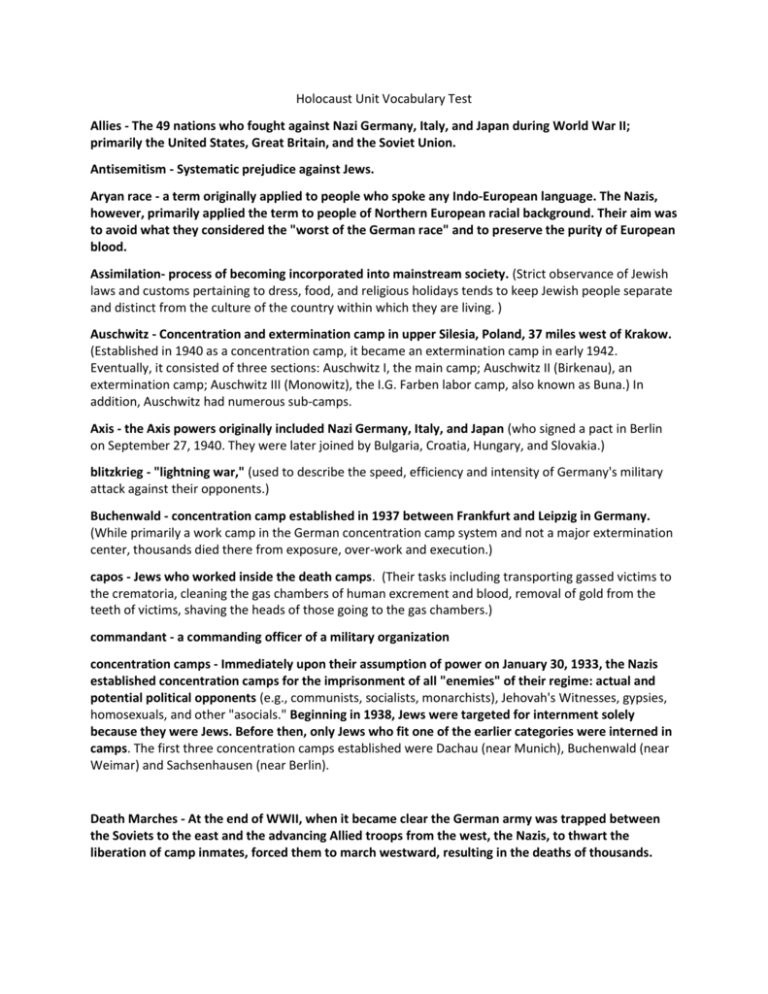
Holocaust Unit Vocabulary Test Allies - The 49 nations who fought against Nazi Germany, Italy, and Japan during World War II; primarily the United States, Great Britain, and the Soviet Union. Antisemitism - Systematic prejudice against Jews. Aryan race - a term originally applied to people who spoke any Indo-European language. The Nazis, however, primarily applied the term to people of Northern European racial background. Their aim was to avoid what they considered the "worst of the German race" and to preserve the purity of European blood. Assimilation- process of becoming incorporated into mainstream society. (Strict observance of Jewish laws and customs pertaining to dress, food, and religious holidays tends to keep Jewish people separate and distinct from the culture of the country within which they are living. ) Auschwitz - Concentration and extermination camp in upper Silesia, Poland, 37 miles west of Krakow. (Established in 1940 as a concentration camp, it became an extermination camp in early 1942. Eventually, it consisted of three sections: Auschwitz I, the main camp; Auschwitz II (Birkenau), an extermination camp; Auschwitz III (Monowitz), the I.G. Farben labor camp, also known as Buna.) In addition, Auschwitz had numerous sub-camps. Axis - the Axis powers originally included Nazi Germany, Italy, and Japan (who signed a pact in Berlin on September 27, 1940. They were later joined by Bulgaria, Croatia, Hungary, and Slovakia.) blitzkrieg - "lightning war," (used to describe the speed, efficiency and intensity of Germany's military attack against their opponents.) Buchenwald - concentration camp established in 1937 between Frankfurt and Leipzig in Germany. (While primarily a work camp in the German concentration camp system and not a major extermination center, thousands died there from exposure, over-work and execution.) capos - Jews who worked inside the death camps. (Their tasks including transporting gassed victims to the crematoria, cleaning the gas chambers of human excrement and blood, removal of gold from the teeth of victims, shaving the heads of those going to the gas chambers.) commandant - a commanding officer of a military organization concentration camps - Immediately upon their assumption of power on January 30, 1933, the Nazis established concentration camps for the imprisonment of all "enemies" of their regime: actual and potential political opponents (e.g., communists, socialists, monarchists), Jehovah's Witnesses, gypsies, homosexuals, and other "asocials." Beginning in 1938, Jews were targeted for internment solely because they were Jews. Before then, only Jews who fit one of the earlier categories were interned in camps. The first three concentration camps established were Dachau (near Munich), Buchenwald (near Weimar) and Sachsenhausen (near Berlin). Death Marches - At the end of WWII, when it became clear the German army was trapped between the Soviets to the east and the advancing Allied troops from the west, the Nazis, to thwart the liberation of camp inmates, forced them to march westward, resulting in the deaths of thousands. Displacement - The process, whether official or unofficial, of people being involuntarily moved from their homes (because of war, government policies, or other societal actions, requiring them to find new places to live. Displacement is a recurring theme in the history of the Jewish people.) genocide - The deliberate and systematic destruction of a religious, racial, national or cultural group. Gestapo - Acronym for Geheime Staatspolizei, meaning Secret State Police. (Prior to the outbreak of war, the Gestapo used brutal methods to investigate and suppress resistance to Nazi rule within Germany.) ghetto - The ghetto was a section of a city where all Jews from the surrounding areas were forced to reside. Surrounded by barbed wire or walls, the ghettos were often sealed so that people were prevented from leaving or entering. (Established mostly in Eastern Europe (e.g. Lodz, Warsaw, Vilna, Riga, Minsk), the ghettos were characterized by overcrowding, starvation and forced labor. All were eventually destroyed as the Jews were deported to death camps.) Holocaust - The destruction of some 6 million Jews by the Nazis and their followers in Europe between the years 1933-1945. (Other individuals and groups were persecuted and suffered grievously during this period, but only the Jews were marked for complete and utter extinction. The term "Holocaust" – from the Hebrew meaning "a completely burned sacrifice" - tends to suggest a sacrificial connotation. The word “Shoah,” originally a Biblical term meaning “desolation,” is the modern Hebrew equivalent.) Judenrat - Jewish community authority, appointed by the Nazis for administration within the ghetto. Euthanasia - Nazi euphemism for the deliberate killings of institutionalized physically, mentally, and emotionally handicapped people. (The euthanasia program began in 1939, with German non-Jews as the first victims. The program was later extended to Jews.) Musselman – term for a concentration camp prisoner who has given up fighting for his/her life. Nazis - Members of Adolf Hitler's National Socialist Party, which started in Germany and was based on hate, prejudice and rule by threat of violence Partisans – irregular troops engaged in guerrilla warfare, often behind enemy lines. During WW II, this term applied to resistance fighters in Nazi-occupied countries. resistance – “underground" organizations working to help the Jews against Hitler/Nazi army SS - Abbreviation usually written with two lightning symbols for Schutzstaffel (Defense Protective Units). Originally organized as Hitler's personal bodyguard, the SS was transformed into a giant organization by Heinrich Himmler. Although various SS units fought on the battlefield, the organization is best known for carrying out the destruction of European Jewry.
